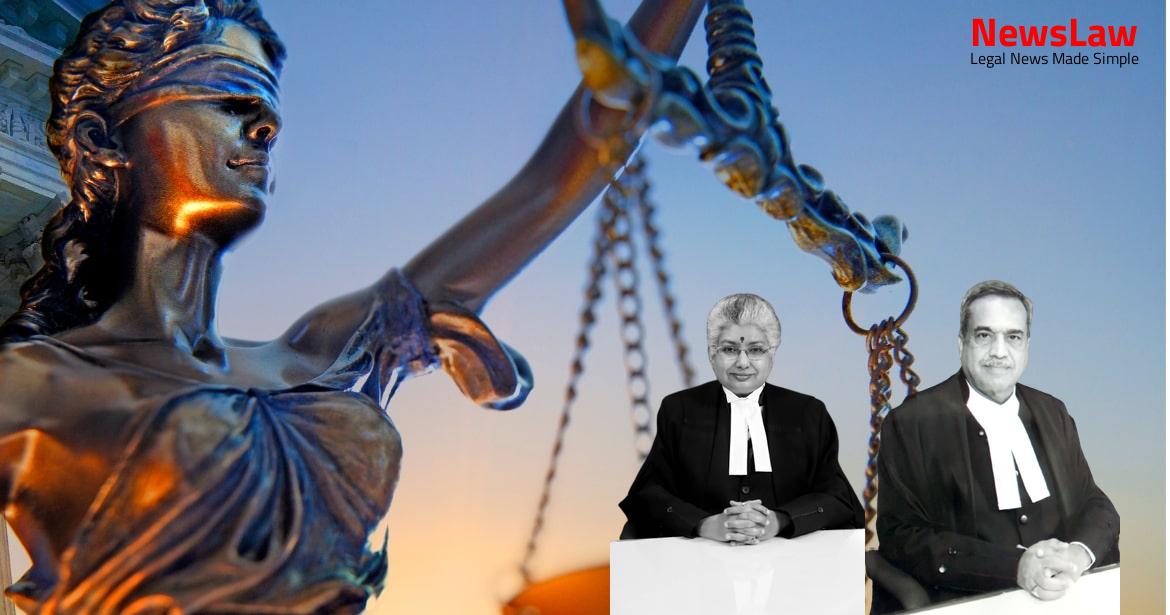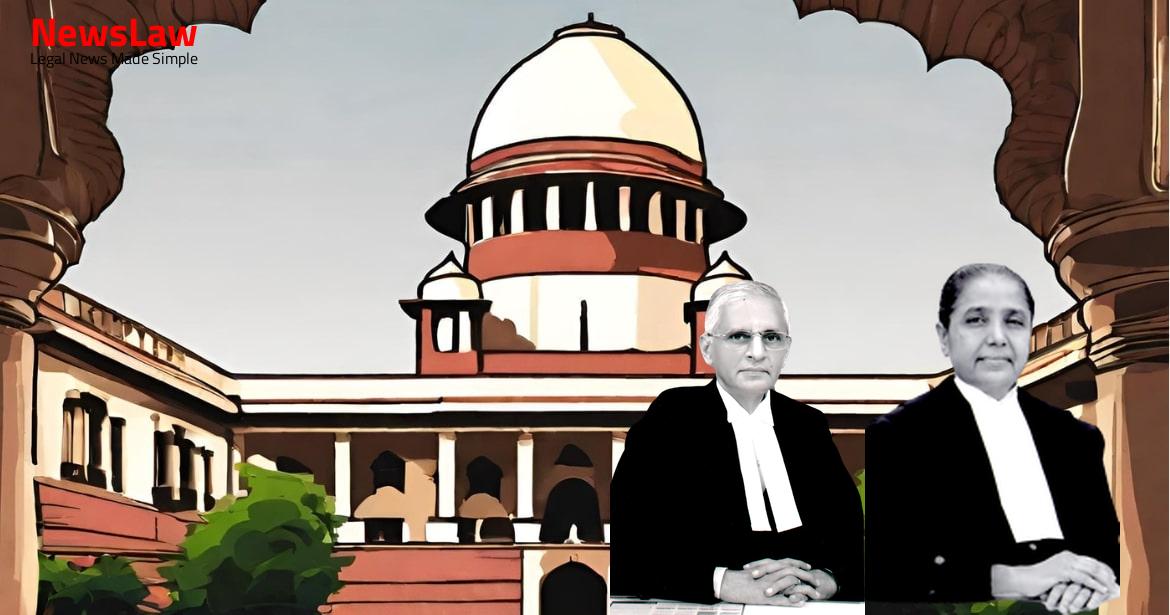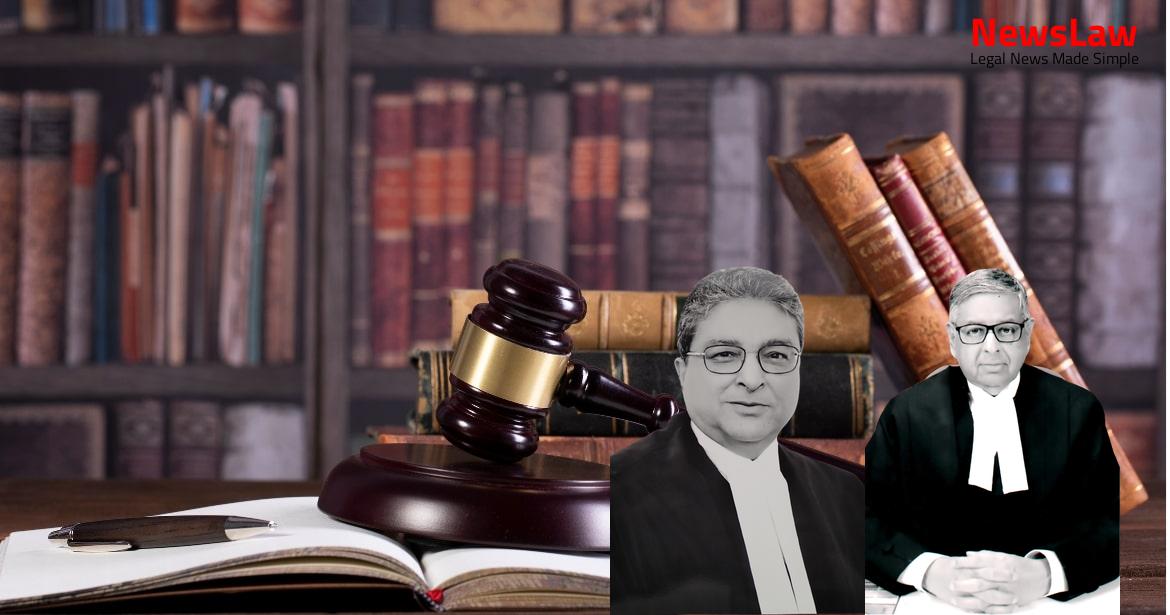Delve into the legal analysis of a complex land possession dispute case where the court examined issues of ownership, possession, and injunctions. Understanding the nuances of title disputes, settlements, and lawful possession is crucial in grasping the court’s decision-making process in such cases.
Facts
- The trial court partly allowed the suit
- The relief of cancellation of the sale deed and declaration was declined
- Defendant No.1 was found to have purchased the entire 6 acres and 15 gunthas of land under a registered Sale Deed dated 17.06.1975
- Plaintiff was believed to be in possession of 5 acres and 15 gunthas of land
- Relief of permanent injunction was granted based on plaintiff’s possession
- Defendant No.1 claimed to have purchased the entire 6 acres and 15 gunthas of land through a registered sale deed executed by the plaintiff’s husband.
- Defendant No.1 asserted possession and cultivation of the entire land for many years, denying any rights of the plaintiff over the property.
- Plaintiff accused defendant No.1 of fraudulently acquiring the entire property, claiming that only 1 acre was intended to be sold due to financial need.
- Plaintiff filed a civil suit seeking cancellation of the sale deed, declaration, and permanent injunction against defendant No.1.
- Defendant No.1 opposed the suit, leading to a Second Appeal filed by him after an adverse decision by the First Appellate Court.
- The dispute revolved around land in Revenue Survey No.49, measuring 6 acres and 15 gunthas, located in Mahadeviya village, District Deesa.
- Defendant No.1’s name was mutated in the revenue records in 1976 based on the sale deed, evidencing his ownership since then.
- Defendant No.1 claimed to have authorized construction projects on the land between 1975 and 1997, further strengthening his ownership claim.
- Plaintiff alleged that defendant No.1 fraudulently registered the entire 6 acres and 15 gunthas under the sale deed.
- The First Appellate Court granted an injunction in favor of the plaintiff, restraining defendant No.1 from disturbing her possession of the land.
- Defendant No.1, who had used the property as collateral for a bank loan, appealed against the injunction granted to the plaintiff.
- Plaintiff maintained that only 1 acre was handed over to defendant No.1, with the remaining 5 acres and 15 gunthas still in her possession.
Also Read: Ruling on Circumstantial Evidence in Murder Case
Issue
- The trial court framed various issues to determine the possession and ownership of the land in question.
- One of the issues was whether the plaintiff could prove that her husband had given 1 acre of land for construction of a well.
- Another issue was whether the defendants had falsely obtained a sale deed for 6 acres and 15 gunthas of land from the plaintiff’s husband.
- The court also examined whether the defendant could prove that he rightfully purchased and possessed the land as per the registered sale deed.
- The question of whether the plaintiff was entitled to a declaration in her favor was also raised in the issues framed by the trial court.
Also Read: Challenging Legal Presumptions in Negotiable Instrument Cases
Arguments
- Original plaintiff is in settled possession of the land in question.
- Defendant No.1’s only remedy would be to file a substantive suit for possession.
- No counterclaim was filed by Defendant No.1 to protect his possession.
- The permanent injunction granted in favor of the plaintiff is deemed unjust and contrary to specific legal provisions.
- Evidence presented by the plaintiff establishes her cultivation and possession of the land.
- The plaintiff was granted permanent injunction by the trial court, upheld by the High Court.
- Defendant No.1 claims possession since 1975 as per Revenue records.
- The sale deed confirms full payment and possession handed over to Defendant No.1.
- Courts below erred in disregarding Defendant No.1’s possession claims.
- Plaintiff’s failure to secure relief on title declaration impacts her entitlement to injunction.
- Plaintiff’s possession is considered unlawful or illegal given the circumstances.
- Concurrent findings by all Courts support plaintiff’s possession claim.
- Defendant No.1 used the suit property as collateral for a bank loan.
- Plaintiff was found to be in possession of the suit land.
- No evidence was presented by defendant No.1 to prove his possession.
- The trial court, First Appellate Court, and High Court affirmed the grant of permanent injunction in favor of the plaintiff.
- Trial court declined temporary injunction in 1997.
- Suit for declaration filed in 1997 challenging the sale deed of 1975.
- If the suit for declaration was barred by limitation, the relief seeking permanent injunction was also barred by limitation.
- First Appellate Court and High Court granted orders of status quo in favor of defendant No.1 to protect possession.
- The order of status quo was extended by the High Court and continued by the Supreme Court.
Also Read: Legal Analysis Critique in High Court’s Quashing Order
Analysis
- An injunction cannot be issued against a true owner or title holder in favor of a trespasser or a person in unlawful possession.
- In a suit for declaration with a consequential relief of injunction, it is not a suit for declaration simpliciter.
- When a party seeks a protective remedy like an injunction and fails to set up a good case, they cannot expect the court to grant an injunction against the rightful owner.
- If the dispute regarding the title is settled against the plaintiff, the suit for permanent injunction against the true owner is not maintainable.
- The relief of permanent injunction is considered a consequential relief and its availability depends on the facts and circumstances of each case.
- Once the substantive relief of cancellation of a registered sale deed is barred by limitation and the title dispute is settled against the plaintiff, the prayer for permanent injunction becomes unsustainable.
- A decree for permanent injunction can only be granted when the person seeking the relief is in lawful possession and entitled to be in possession.
- In the case of Jharkhand State Housing Board Vs. Didar Singh and Anr., (2019) 17 SCC 692, the High Court of Delhi’s findings in Thomas Cook (India) Ltd. Vs. Hotel Imperial (2006) 88 DRJ 545 were approved.
- The settled possession of a person in unlawful possession cannot be disturbed forcibly by the true owner without court adjudication.
- The expressions ‘due process of law’ or ‘due course of law’ mean a person in settled possession cannot be ejected without court adjudication.
- A person cannot be ejected without court adjudication when a genuine dispute regarding title is raised, clouding the title of the plaintiff.
- If the defendant is held to be the true owner with a registered sale deed, there is no cloud over the title of either party.
- When the plaintiff fails to obtain relief for cancellation of the sale deed and declaration of title, only the relief of permanent injunction remains.
- In the case of A. Subramanian Vs. R. Pannerselvam, (2021) 3 SCC 675, it was observed that a person in possession of land as the assumed owner has good title against all but the rightful owner.
- The plaintiff’s failure to make out a case for an injunction does not mean that its cessation of user of the said two rooms would have been brought about without recourse to law.
- Once the rights of the parties are adjudicated and defendant No. 1 is held to be the true owner based on the registered sale deed and full payment of sale consideration, due process of law has been followed.
- Plaintiff is not entitled to any permanent injunction against the true owner after due process of law has been followed.
- All courts erred in granting permanent injunction in favor of plaintiff when the defendant No. 1 is the true owner and plaintiff had no title.
- After establishing that the plaintiff had no title, and dismissing the suit for cancellation of the registered sale deed and declaration, plaintiff is not entitled to the relief of permanent injunction against defendant No. 1.
Decision
- The judgment and decree passed by the trial court, confirmed by the First Appellate Court and the High Court, are quashed and set aside.
- Consequently, the suit filed by the plaintiff for permanent injunction against defendant No.1 is dismissed.
- The present appeal succeeds, but there will be no order as to costs.
- The present appeal is allowed, quashing and setting aside the judgment and decree passed by the trial court regarding granting permanent injunction.
- As a result, the entire suit filed by the plaintiff is dismissed.
Case Title: PADHIYAR PRAHLADJI CHENAJI Vs. MANIBEN JAGMALBHAI (DECEASED) THROUGH LRS. (2022 INSC 258)
Case Number: C.A. No.-001382-001382 / 2022



